THE VANYA EXPERIMENT
The wunderkinds of American theater, Annie Baker and Sam Gold, ages 31 and 34 respectively, follow up their earlier collaborations, among them Ms. Baker’s remarkably successful Circle Mirror Transformation, with another innovative production, this time of Chekhov’s classic Uncle Vanya (adapted by Ms. Baker, with Mr. Gold directing).
The goal of Ms. Baker’s adaptation is to be faithful to Chekhov and to make the play sound to American ears the way it sounded to Russians when it was first performed; an admirable goal. She also seems to be trying to make it more Russian: The words Uncle Vanya – ДÑÐ´Ñ Ð’Ð°Ð½Ñ – hang in big, glowing, Cyrillic letters on the wall of the house, and a muzhik (or peasant) sings songs “in Russian” (actually, a combination of Russian and gibberish, which is probably good enough to sound authentic to those who don’t speak the language). Ms. Baker also reinserts, among other things, a reference to Aivazovsky, a Russian painter virtually unknown outside that country, which is omitted in most translations of the play.
It’s difficult to say whether “authentic” details make Ms. Baker’s version of the play better than other English language versions (certainly, keeping Chekhov’s poetic monologues poetic doesn’t do those actors incapable of performing them any favors). Ultimately, the only way to make Uncle Vanya truly authentic is to have Russian actors perform it in Russian. Outside of that the question of authenticity becomes a very slippery one, and rather than attacking it head on, it seems a better idea to find some roundabout way, a back door, to keeping the essence and nuances of the work intact, while at the same time making it personal and accessible to a foreign audience. This appears to be the collaborators’ other goal.
With most of Chekhov’s characters (and this is true to a large extent for Russians in general) every phrase, every gesture, is laced, at least to some degree, with irony, self-deprecation, and acute self-awareness. And these are not simply superficial affects. These qualities are deeply ingrained in the characters’ beings and come from a profound sense of the futility and meaninglessness of their existence – profound being the operative word. For this state is not simply a thing in itself; one is not born a cynic. Rather cynicism is the result of a hopeful, loving individual, full of energy, desire and ambition, encountering continual failures and disappointments in life, until his wonderful qualities atrophy and he becomes crusty and hard. Ironically, the more sensitive the individual, the more faith and hope he has at the start of his journey, the more disillusioned and spiteful he becomes towards the end (at least in Chekhov). It’s on this foundation that the personages in Uncle Vanya are built and it is this foundation that appears precarious in a number of the performances in this show.
The greatest performance is given by Peter Friedman as Serebryakov, a retired professor with numerous afflictions and a wife who is much too young for him. With deft precision, Mr. Friedman captures the failed intellectual who turns out to be little more than a petty, selfish, egotistical pedant. Also excellent (for the most part), was Reed Birney as Vanya, Serebryakov’s former brother-in-law, who’s sacrificed his youth working on the estate to support the professor only to find himself bitter and disillusioned with him. Mr. Birney captures beautifully Vanya’s sarcasm, cynicism, desperation, and self-loathing. He seemed less believable as someone who’s worked with his hands on a country estate all his life. And his feelings of love and resentment towards Yelena (Maria Dizzia), the professor’s young wife, seem a bit unconvincing (though this last issue could well have been due, at least in part, to Ms. Dizzia’s uninspired performance). The usually brilliant Michael Shannon is merely good as the doctor, Astrov, a self-despising shell of the man he once was. Mathew Maher is delightful, with exceptional comic timing, as Telegin, aka “Waffles.” Paul Thureen rounds out the male cast as the muzhik Yefim.
A common problem among all of the actresses is the lack of love and spirituality in their portrayals of their characters, two qualities which are absolutely essential to making those characters work. Yelena is an intelligent, sensitive, loving woman who made a choice, for whatever reason, to cut herself off from life by marrying the old, stifling professor. Yelena’s tragedy is that she knows better (and is also in love with Astrov), but none of this is expressed in Ms. Dizzia’s performance. Neither does she exhibit the femininity and sensuality necessary to make her attractive in spite of her flaws. Hence, the wasted potential that both Astrov and Vanya see in Yelena isn’t visible to us, which undermines that entire part of the story, as well as related aspects of both Mr. Shannon’s and Mr. Birney’s performances.
Merritt Wever as Sonya, Professor Serebryakov’s grown daughter from his first marriage and Vanya’s niece, manages quite well in the relatively light-hearted beginning but flattens out under the weight of more complex emotions as the play progresses. She captures Sonya’s simplicity but not her wise tenderness and sincerity, the lack of which makes her sound in some of her speeches like a patronizing, adolescent American bitch. As for Chekhov’s poetic monologues, Ms. Wever is unable to personalize them; they sound false and pretentious.
Georgia Engel is entertaining as the ditsy old nanny, Marina. But she plays her character on one note and we never feel the maternal concern that balances out the character’s scatter-brained persona. Rebecca Schull is appropriately small-spirited as Maria, mother of Vanya and Professor Serebryakov’s first wife.
In general the performances suffer from a lack of unity; there’s often the sense that the actors, not the characters, are all going in different directions.
The theater setting and the house are designed as one, under an A-frame roof, with a carpeted floor where the action takes place, surrounded on all four sides by carpeted levels, where audience members sit, cross-legged mostly (or in a similar fashion), propped up by pillows (set design by Andrew Lieberman). Initially, at least, this makes for a very cozy and intimate atmosphere, with actors often inches away from the viewers. As a result, one isn’t merely watching the play but finds oneself in the space with the characters, literally inside the world of the show. After a while however, the seating arrangement makes sitting through the two-and-a-half-hour show in a packed house quite trying. Still, being in the same space as the actors creates an additional layer of familiarity. The performers aren’t high up on a stage or a movie screen, they’re right next to you, using words you could be using, wearing clothes you could be wearing (the costumes, designed by Ms. Baker, are contemporary street clothes). This makes for an interesting effect. With no theatrical trappings (save for a few choice props by Kate Foster, and terrifically evocative lighting by Mark Barton) the actors have nothing to hide behind. They’re not doing tricks, they’re making magic happen right before your eyes, and they’re doing it especially for you, creating a world with only their bare hands, so to speak’¦or at least that seems to be the idea. And were this not Chekhov, the experiment might have come off brilliantly.
Ms. Baker’s Uncle Vanya can’t help but call to mind Louis Malle’s superb Vanya on 42nd Street. Mr. Malle ingeniously solved the problem of adapting alien material by transforming it into a show within a show. In this way, when an American actor uses words like kopeks and rubles and samovar and Mikhail Lvovich, it doesn’t offend the ear with false notes; we know these are American actors rehearsing a Russian play and we are ok with that; it’s part of the world we are meant to see. By having Ms. Baker’s Uncle Vanya take place in what could be your living room (with the actors wearing contemporary street clothes and using minimal props), it seems that a similar awareness of a play being performed was supposed to neutralize the play’s foreignness, making it more accessible and immediate. Regrettably, the numerous problems with the performances make it impossible to know whether or not this brave experiment can work. Ultimately, in this case it doesn’t.
photos by Julieta Cervantes
Uncle Vanya
Soho Rep
scheduled to end on July 22, 2012EXTENDED to August 26, 2012
for tickets, visit Soho Rep

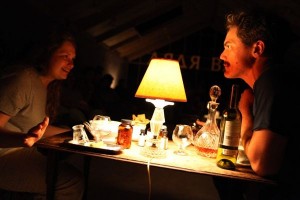
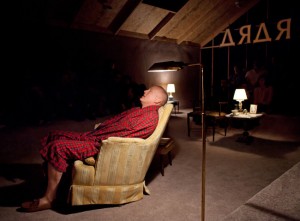
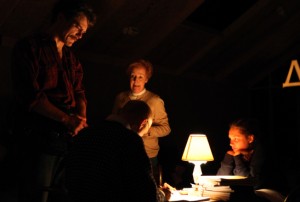
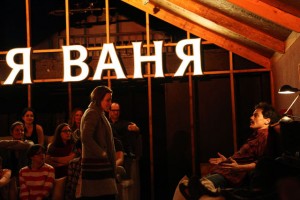
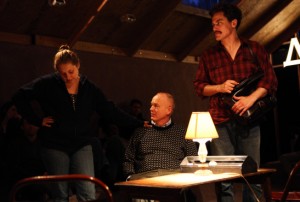
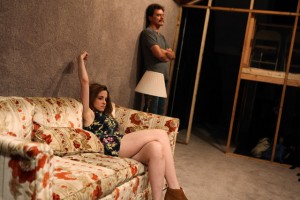
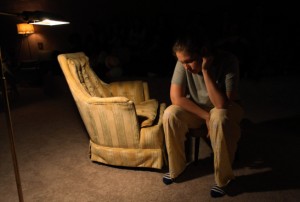

{ 2 comments… read them below or add one }
Dear Mr. Zvonkov,
I was thoroughly taken by your review of VANYA. Though I did not see the production (I live and write in Los Angeles), I have seen so many dreary productions of Chekhov’s plays as to instinctively agree with you – specifically, the lack of understanding by American theatre people (not all) of the Russian mentality. (I am reminded of a meeting years back at the WGA when a group of visiting Russian film directors were talking about their work – Klimov, others, but not the late great Larisa Shehitko whose masterpiece, THE ASCENT, is one of the glories of World Cinema; in any case, a beautiful young writer whose empty head equalled her physical beauty asked one of the directors, “How can I learn more about Russia, ” to which I screamed, “Read Bulgakov, etc.” A question like that from a writer? Absurd, no? Then again, I think she wrote sitcoms.)
In any case, I sent your review on to friends (as I often do Harvey Perr and in the NR, Stanley Kauffman – the best film critic this country has had the luck to have) and said, “And I would say these Russian characteristics can be found in me and many of my friends, perhaps not as deeply ingrained, but still there. The continual letdowns, betrayals and lies one encounters not only in ‘the Theatre’ (multiplied ten fold in ‘the Biz’) and of course in life (though nothing compared to what Grossman talks about in EVERTHING FLOWS), these letdowns, betrayals and loss of hope is exactly why Chekhov is so continually current in our lives and on our stages.”
Keep up the good work.
Thank you for the kind words and taking the time to write a heartfelt response, Mr. Udoff.